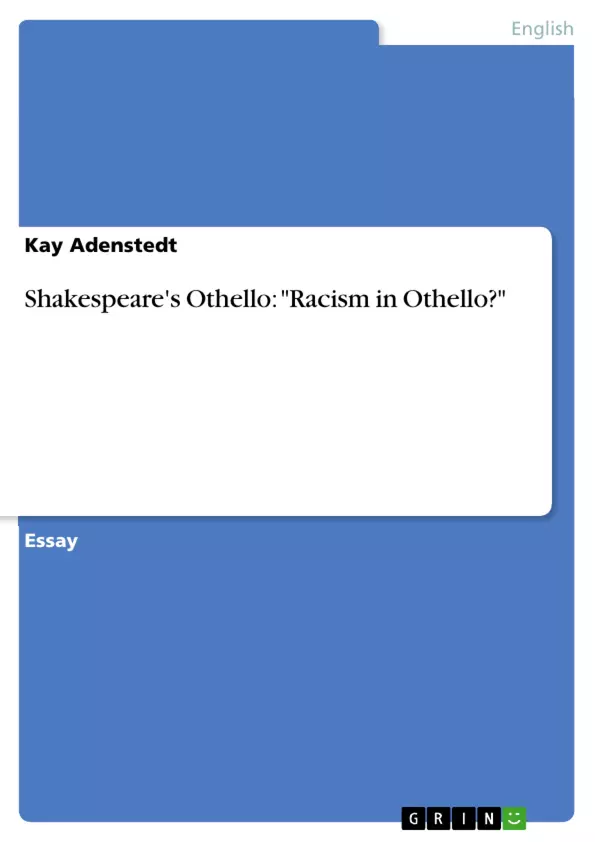Shakespeare’s Othello has caught people’s attention for more than four hundred years now. This is may be true for many other Shakespearean plays as well, but Othello was exceptionally popular at its time of origin and is not less so today. Reasons for this are probably manifold, but the notions of gender, sexuality, status and race which are still very current issues might contribute to this timeless and universal appreciation. The latter is at the focus of this essay.
Table of Contents
- Racism in Othello?
- Is there a consistent notion of prejudice and discrimination in Othello?
- A more thorough analyse of the two main characters in the play
Objectives and Key Themes
This essay examines the portrayal of racism in Shakespeare's Othello. The author investigates whether consistent notions of racism exist within the play, analyzes the characters of Othello and Iago in terms of racism, and ultimately provides a personal interpretation of Othello and the play's possible intentions.
- The use of the term "Moor" and its potential for prejudiced connotations
- The paradoxical nature of Othello and Iago's characters
- The role of jealousy and hatred in Iago's motivations
- The impact of stereotypes on the portrayal of Othello
- The reversal of stereotypes throughout the play's plot
Chapter Summaries
- The essay begins by examining the historical context and the prevalence of the term "Moor" in Shakespeare's play. It explores the potential for prejudiced interpretations of this term, acknowledging that while sometimes used neutrally, it can also carry negative connotations.
- The author then examines the characters of Othello and Iago, highlighting their paradoxical nature. Othello, a black Moor, is admired by many but ultimately falls victim to Iago's machinations. Conversely, Iago, a seemingly ordinary Venetian soldier, acts as the play's villain, demonstrating that appearances can be deceiving.
- The essay delves into Iago's motivations, emphasizing the role of jealousy and hatred. His envy of Othello's success, fame, and love fuels his desire for revenge, and his racial comments are seen as expressions of these deeper emotions.
Keywords
The main keywords of this essay include racism, prejudice, discrimination, xenophobia, stereotypes, Othello, Iago, Moor, jealousy, hatred, and paradox.
Frequently Asked Questions
Does Shakespeare's Othello contain consistent notions of racism?
The essay investigates whether prejudice and discrimination are consistently portrayed or if the racial comments serve other narrative purposes.
What is the significance of the term "Moor" in the play?
The term is analyzed for its historical context and potential for both neutral and prejudiced connotations.
What motivates Iago's racial comments?
The essay argues that Iago's racial remarks are often fueled by deeper emotions like jealousy, hatred, and envy of Othello's success.
How are stereotypes used in Othello?
Shakespeare employs stereotypes but also reverses them; for example, Othello is the admired general while the Venetian Iago is the villain.
Why is Othello still relevant today?
The play's themes of gender, status, and race remain universal and current issues, contributing to its timeless appreciation.
Are Othello and Iago seen as paradoxical characters?
Yes, the essay highlights the paradox of Othello's nobility versus his downfall and Iago's outward honesty versus his inner malice.
- Quote paper
- Kay Adenstedt (Author), 2009, Shakespeare's Othello: "Racism in Othello?", Munich, GRIN Verlag, https://www.grin.com/document/134855



